Sleep for Health in Hospital

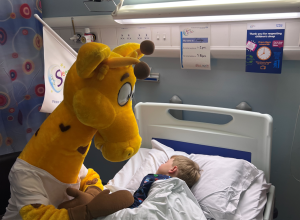
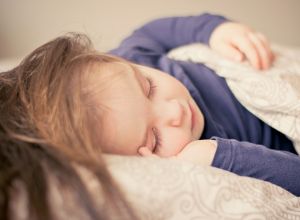
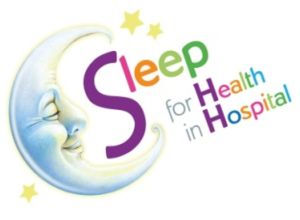
What is Sleep for Health in Hospital (SHH?)
Research on children’s wards has shown that many children and their parents or carers struggle to get a good night’s sleep in hospital. Patients and families have told us that it can be difficult to settle down to sleep when the wards are busy, and this can affect how you feel during the day.
- Sleeping well is important for both physical and mental health for all children and their families, particularly those who are inpatients on the wards for prolonged stays whilst recovering from illness or surgery.
- Our project wants to work to minimise noise and disturbances during nighttime sleep and daytime naps as much as possible. We aim to help ensure everyone on our wards can get a good night’s sleep.
- This information explains what is involved, along with details of how parents and visitors can help children and young people to settle down on the ward in the evenings, ready for a good night’s sleep.
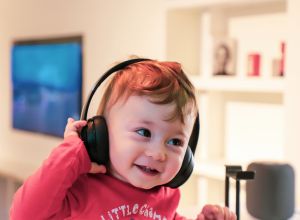
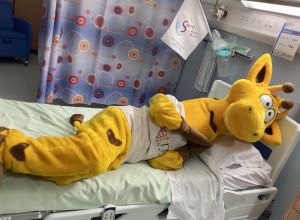
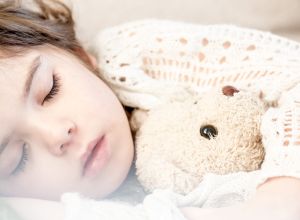
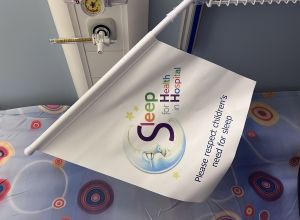
Eight is Late!
Visiting times
Whilst visiting on the wards is open, we would ask that visitors could leave by 8pm unless staying overnight. Remember that comings and goings on the ward can be very disruptive.
Please respect this and leave quietly.
Lights out at 8pm
Many children on the ward will have earlier bedtimes, but at 8pm every evening, the ward lights will be dimmed.
Electronics off or silenced with headphones
Bedside televisions have terrestrial channels free of charge until 7pm. After this point, a tv card will need to be purchased. We would ask that after 8pm anyone watching uses headphones to silence the noise for the ward.
What can parents or visitors do to help?
‘Silence is golden’
This is especially true when helping children get a good night’s sleep in hospital. You can help all of the children on the ward by keeping noise to a minimum:
- Use headphones for electronic equipment (Mobiles/tablets)
- Talk quietly
- If you need to speak on a mobile phone, please talk quietly, and if you are able, please leave the ward
- If you find you are disturbed by staff delivering care to other patients during the night, please let them know
- Keep the lights down low; dim screens where possible and switch them off at your child’s bedtime
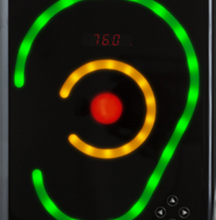

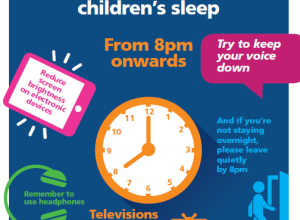

SoundEars
We have installed SoundEars on the wards which monitor the noise levels and are there as a visual reminder about how loud it can be. They mean that we can also see if our project is making a difference to overall sound levels on the wards.
Posters have been designed so that you can tell us about your child’s sleep: what time they go to bed and when they have their naps. This will highlight to ward staff, so that if we can avoid disturbing their sleep, we will.
What does the SHH project mean for my child?
A calm environment and regular bedtime routine can help children settle down to sleep, so we want to help promote this in the hospital. This means:
Bedtime signs:
- Your child’s bedtime and nap time will be written on a sign near to their bed as a reminder to staff and visitors to respect their sleep time.
- Remember that wke up time can be early in hospital, so your child may need to settle down earlier than at home to get enough sleep
Top tips for a healthy sleep
 Here are some useful tips on helping to get a good night’s sleep both for in hospital and at home.
Here are some useful tips on helping to get a good night’s sleep both for in hospital and at home.
-
Light
Blue light stops children falling asleep, it stops the brain producing the sleep hormone melatonin that eases us into sleep. Blue light is found in ordinary white lightbulbs and in most electronic devices (TVs, mobile phones and tablets). Ideally try to switch off electronic devices and dim the lights 1-2 hours prior to bedtime.
-
Sound
Our brains stay tuned to sound, and while we’re sleeping hearing is our most alert sense, which allows us to wake in times of danger. Keep noise to a minimum once a child is asleep to avoid disturbing them.
-
Food
Eating close to bedtime can make it tricky to fall asleep. Caffeine is also a powerful sleep blocker and can stay in the body for 8 hours. It’s found in tea, coffee, cola and energy drinks and also in chocolate. If your child struggles to get to sleep, try to avoid caffeine after lunch.
-
Worries
Being in hospital can be very daunting; the disruption to routine, lots of noise around you from patients and machines and this can make it difficult to relax. By following familiar bedtime routines, reading a familiar book and having a teddy from home can make your child feel less anxious and get a better night’s sleep.
If you have any concerns about your child’s sleep, please speak to the nurse or doctor looking after them.
How do I work out how much sleep my child needs?
All children are different, but this is a guide to average sleep requirements.
| Child's Age | Hours of sleep needed |
|---|---|
| 1 to 3 years | 12 hours |
| 3 to 5 years | 11 hours |
| 5 to 13 years | 10 hours |
| Teenagers | 9 hours |




